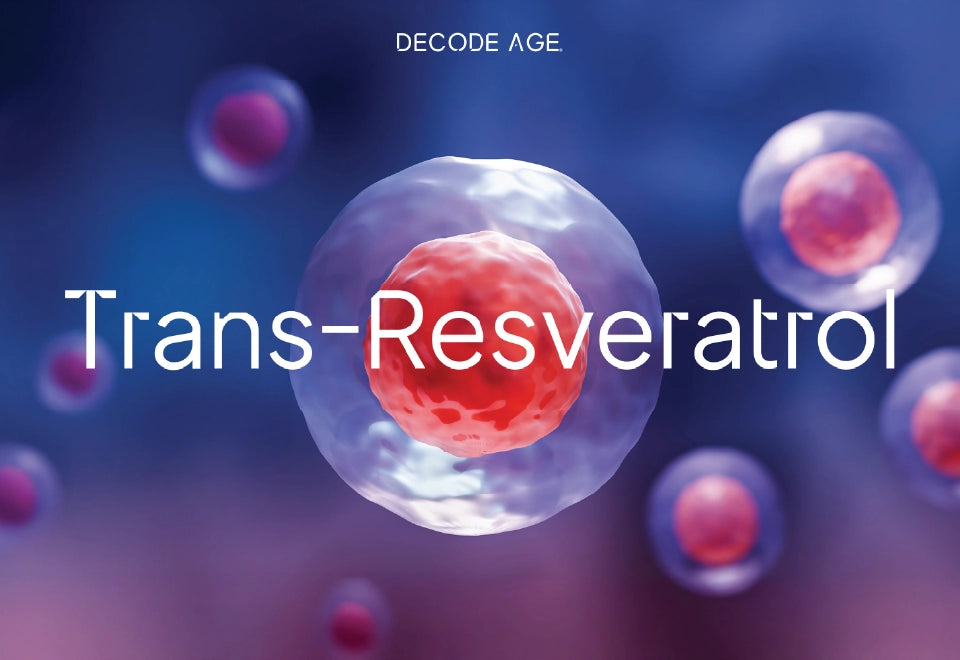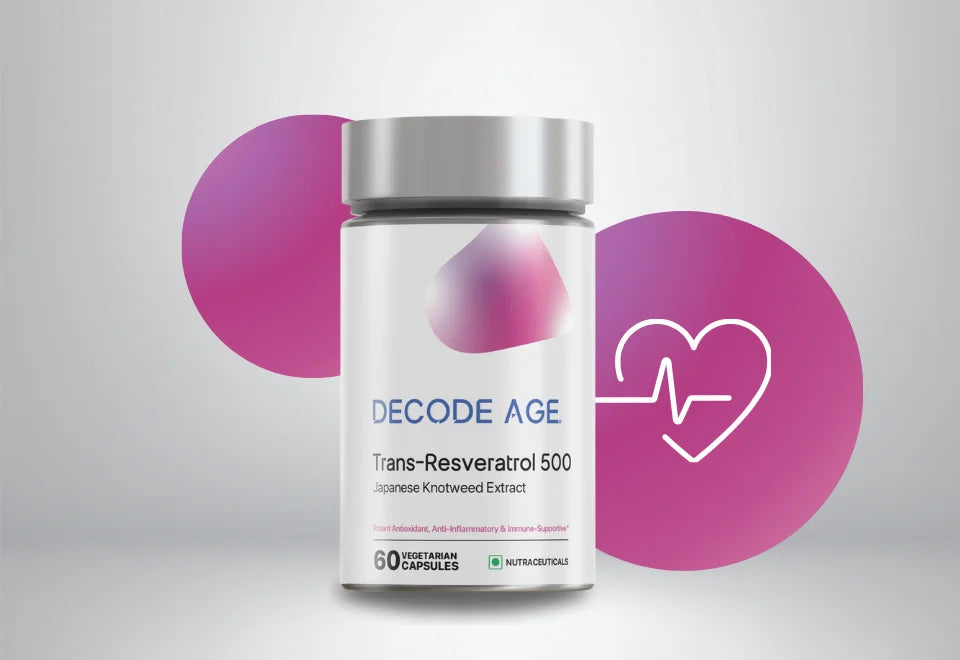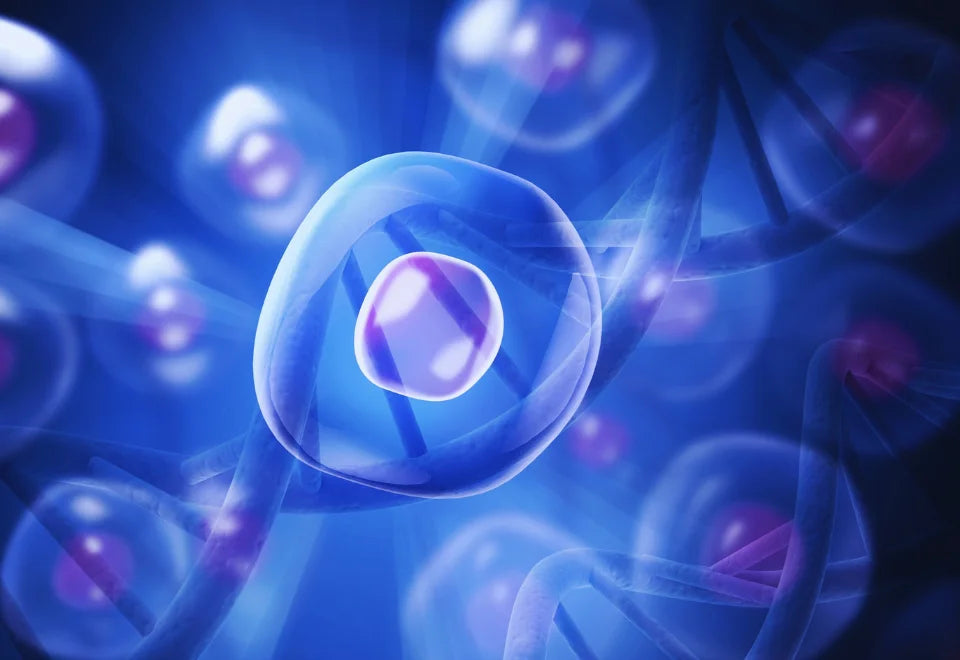Trans-Resveratrol, also known as RSV, is a natural antioxidant found in plants renowned for its rejuvenating effects on animal models, tissues, and organs, particularly stem cells. Stem cells, pivotal in reversing visible signs of ageing by regenerating damaged tissues and enhancing cellular function, are adversely affected by age-related factors like hormonal, immunologic, and metabolic disorders. Thus, preserving stem cells becomes essential for both research and clinical applications. In 2024, Trans-Resveratrol stands out for enhancing stem cell vitality and addressing ageing complexities.
Why Stem Cells Get Old: Exploring the Mechanisms of Ageing
Stem cells are fundamental, unspecialized cells with the remarkable ability to renew themselves indefinitely and differentiate into specialised cells with specific functions. They gained prominence in 1998 with Dr. James Alexander Thomson's breakthrough in generating embryonic stem cell lines. These cells have been discovered in various stages of human development, from the inner cell mass of embryos to adult organs and tissues like the umbilical cord and placenta. Stem cells exhibit plasticity, meaning they can differentiate into cell types beyond their resident tissues, making them valuable for regenerative medicine.
Ageing is a significant factor in many human diseases, causing about two-thirds of the daily deaths worldwide, out of approximately 150,000 people. Ageing negatively affects stem cells, diminishing their ability to regenerate and worsening age-related illnesses. As individuals age, their stem cells become less effective, leading to cell death, senescence, or reduced regenerative capacity. This decline is linked to genetic changes, including altered function in genes such as p53 (tumour protein p53) and mTOR (mammalian target of rapamycin). According to the "stem cell theory of ageing," the inability of pluripotent stem cells to replace tissues with fully functional cells contributes to the ageing phenomenon.
Despite the potential of stem cell research in treating diseases, ageing compromises its therapeutic effectiveness. To unlock effective therapies for age-related and stem cell-related diseases, it's crucial to comprehend the molecular mechanisms underlying ageing and stem cell dysfunction. Scientists are actively delving into the ageing processes and causes of stem cell dysfunction to tackle diseases associated with ageing. Stem cell research, especially in rejuvenating aged or cultured stem cells, offers immense promise in transforming medicine and fighting age-related diseases. (Ahmed et al., 2017b; Mi et al., 2022)
Factors Affecting Stem Cells
Various factors affect how stem cells function, leading to stem cell dysfunction and age-related diseases.
- DNA Damage: Our genetic material, DNA, is susceptible to damage from both internal processes and external factors like UV radiation or reactive oxygen species (ROS). This accumulation of damage over time can overwhelm DNA repair mechanisms, leading to mutations and premature ageing in stem cells.
- Mitochondrial dysfunction: As we age, mitochondrial dysfunction occurs, leading to age-related mitochondrial DNA mutations. These mutations disrupt cellular pathways such as IGF-1 (Insulin-like Growth Factor 1) and mTOR, potentially contributing to ageing and age-related diseases. This dysfunction results in increased reactive oxygen species (ROS) and calcium level imbalances, impacting stem cell ageing and leading to cell death.
- Epigenetic alteration: Epigenetics alters gene expression without changing the DNA, impacting stem cell function through ageing-induced DNA methylation and histone changes. These epigenetic modifications in stem cells can impact their destiny. Mutations in epigenetic regulators are associated with certain cancers. These reversible changes make them promising targets for disease treatment.
- MicroRNAs: MicroRNAs (miRNAs) are tiny RNA molecules that control how stem cells renew and change into different cell types. They're vital for gene regulation in stem cells, impacting their development and involvement in diseases. Certain miRNAs are investigated as possible indicators of stem cell ageing.
- Microenvironment (Stem Cell Niche): Age-related hormonal, immune, and metabolic issues can hinder stem cell function by altering their microenvironment. This can lead to problems like osteoporosis. Changes in metabolism, such as high blood sugar and insulin levels, can also affect stem cell health and function.
- Hormonal Changes: As cells age, they release substances that can affect nearby organs or tissues. Changes in hormone levels due to ageing, like those of sex hormones, can impact the upkeep and specialisation of stem cells. For instance, not having enough oestrogen can lead to the biassed specialisation of mesenchymal stem cells (MSCs). Moreover, increased levels of certain inflammatory molecules like IL-6 (Interleukin-6 ) and tumour necrosis factor-alpha (TNF-α) can disturb the function of MSCs.
How Does Trans-Resveratrol Enhance Stem Cell Regeneration?
Trans-Resveratrol is the biologically active form that is commonly found in various plants and supplements. It's considered more stable and bioavailable compared to its cis-isomer and has gained attention for its potential health benefits. Recent studies delve into its impact on stem cell regeneration, the body's building blocks with the unique ability to develop into different cell types, focusing on pluripotent stem cells (PSCs) and multipotent stem cells.
Researchers have found that Trans-Resveratrol can influence the behaviour of different types of stem cells. For instance, it boosts the survival, proliferation, and differentiation of pluripotent stem cells, which are involved in early development. Moreover, it promotes the maintenance of PSCs' pluripotent status, ensuring they retain their ability to develop into various cell types. It also seems to play a role in the differentiation of MSCs, a well-known type of multipotent stem cell that is found in adult tissues, ensuring they maintain their capability to differentiate into various cells within a single germ layer. Studies suggest that Trans-Resveratrol can regulate the self-renewal and differentiation of these cells, potentially enhancing their application in therapies for conditions like osteoporosis and cardiovascular diseases.
Interestingly, recent studies have shown that oral intake of adequate amounts of trans-resveratrol can prevent bone fractures. This finding supports the idea that trans-resveratrol supplements could serve as a valuable medical treatment for enhancing bone tissue formation in osteoporotic bones. Hence, trans-resveratrol shows promise in managing the viability, self-regeneration, and specialization of diverse stem cells, suggesting potential treatments for age-related conditions. However, the complexity of its effects requires careful consideration of factors influencing its impact on different types of stem cells. (Safaeinejad et al., 2018)
Benefits of Resveratrol Supplementation on Stem Cells
- Activation of SIRT1: Resveratrol is known to activate a protein called SIRT1 (sirtuin 1), which is involved in regulating various cellular processes, including stem cell function and regeneration. SIRT1 activation has been linked to enhanced stem cell survival, proliferation, and differentiation in various tissues.
- Enhancement of mitochondrial function: Resveratrol has been shown to improve mitochondrial function, the energy-producing organelles within cells. Healthy mitochondria are crucial for maintaining the viability and functionality of stem cells, and by enhancing mitochondrial function, resveratrol may support stem cell regeneration.
- Activation of AMPK pathway: Resveratrol can activate AMP-activated protein kinase (AMPK), a cellular energy sensor that regulates various metabolic pathways. AMPK activation has been associated with increased stem cell survival and proliferation in response to stressful conditions.
- Modulation of signalling pathways: Resveratrol can modulate various signalling pathways involved in stem cell regulation, including the Wnt, Notch, and Hedgehog pathways. These pathways play crucial roles in controlling stem cell fate decisions such as self-renewal and differentiation.
- Protection against oxidative stress: Resveratrol possesses antioxidant properties, which help protect cells, including stem cells, from oxidative damage caused by free radicals. By reducing oxidative stress, resveratrol may help preserve stem cell function and promote their regenerative capacity.
Conclusion
In conclusion, trans-resveratrol emerges as a promising solution for enhancing stem cell vitality and combating the complexities of ageing. Its rejuvenating effects on various stem cell types offer hope for addressing age-related challenges. As we delve deeper into its mechanisms, trans-resveratrol remains a standout option for individuals seeking to rejuvenate stem cell function and mitigate the effects of ageing, promising a pathway towards healthier ageing and improved longevity.
FAQs
Do stem cell supplements work?
Stem cell supplements, like Trans-Resveratrol, show potential benefits for stem cell function, including self-renewal, apoptosis protection, and the promotion of osteogenesis while inhibiting adipogenesis. This hints at Trans-Resveratrol's potential in treating age-related disorders. However, limited evidence supports the idea that such supplements increase the body's stem cells. Additional research is needed to confirm its effectiveness and safety.
Can stem cells reverse ageing?
Stem cell (SC) therapies hold significant promise in regenerative medicine due to the inherent biological characteristics of SCs, including plasticity, self-renewal, and multidirectional differentiation potential. Consequently, there is potential for stem cells to delay or even reverse the ageing process.
What is the stem cell theory of ageing?
The stem cell theory of ageing proposes that ageing occurs due to the decline in the ability of stem cells to replenish tissues with functionally differentiated cells, essential for maintaining the tissue or organ's original function.
Why do we lose stem cells as we age?
As we age, adult stem cells experience cellular senescence and apoptosis, leading to decreased functionality. These cells exhibit senescence-specific characteristics like altered morphology, reduced proliferation, and impaired biological functions. Age-related declines in adult stem cell function are attributed to various factors, including cellular damage, alterations in the stem cell niche, and changes in circulating blood factors.
Does Trans-Resveratrol increase stem cells?
Yes, Trans-Resveratrol has been found to increase stem cells by influencing their behaviour. It boosts the survival, proliferation, and differentiation of stem cells like pluripotent stem cells (PSCs) involved in early development. Additionally, it supports the maintenance of PSCs' pluripotent status and aids in the differentiation of mesenchymal stem cells, ensuring their capability to differentiate.
What are p53 and mTOR, and what is their function?
p53 and mTOR are crucial proteins regulating cell behaviour. The p53 gene acts as a tumour suppressor, governing cell division and apoptosis. Mutations in p53 can promote cancer development. Meanwhile, mTOR, or mammalian target of rapamycin, regulates cellular processes like metabolism, immunity, and growth, ensuring cellular equilibrium.
Is Decode Age Trans-Resveratrol safe for the liver?
Yes, Decode Age Trans-Resveratrol is generally considered safe for the liver. Research suggests that Trans-Resveratrol can offer protection against various forms of liver damage, including damage caused by chemicals, cholestasis, and alcohol. Furthermore, it has been shown to enhance glucose metabolism, improve lipid profiles, reduce liver fibrosis and steatosis, and alter the fatty acid composition of liver cells.





























Leave a comment
All comments are moderated before being published.
This site is protected by hCaptcha and the hCaptcha Privacy Policy and Terms of Service apply.